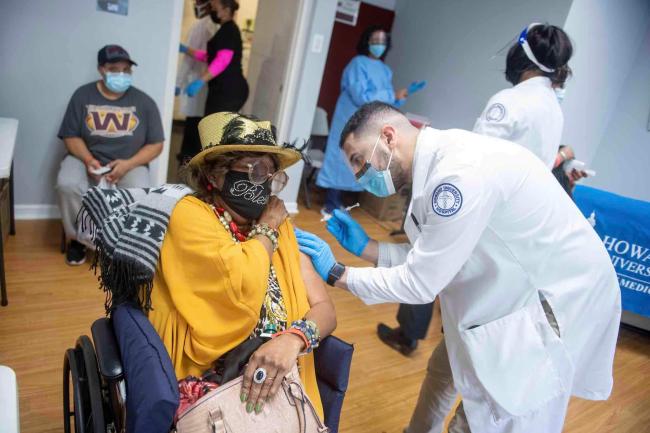Howard University’s clinical research capabilities received a boost with a grant from the Novartis US Foundation, which will establish a Clinical Trial Center of Excellence on its campus.
Involving African Americans and other minority populations in studies for the development of new treatments is going to be extremely important, said Hugh E. Mighty, dean of Howard University College of Medicine (HUCM) and senior vice president of health affairs. This requires increased capabilities and infrastructure to support additional facilities, equipment, and more. “Not only do we have to expand our faculty of experts, but we also have to train and put in play a future pipeline of scientists to lead that process. So, the ability to do that rests, of course, on having resources; this grant from the Novartis US Foundation allows us to continue to build out those resources,” he said.
The Center of Excellence proposed under the Novartis US Foundation grant adds to those Howard already has in five categories, Mighty said, including sickle cell disease; a National Human Genome Center; and the Georgetown-Howard Universities Center for Clinical and Translational Science (GHUCCTS), a consortium with Georgetown University and other medical institutions for clinical research for underserved groups, including people with disabilities, elderly populations, and people of color.
In August, Howard announced plans to build the National Research Center for Health Disparities, a 260,000 square-foot facility meant to draw pharmaceutical companies and biomedical research organizations driving innovative solutions to chronic diseases affecting people of color. The Clinical Trial Center of Excellence on Howard’s campus will inform the work of the National Research Center for Health Disparities by contributing invaluable information and expertise.
Howard also received a four-year, $4.08 million grant in March from the American Cancer Society for a Cancer Health Equity Research Center, which will examine ways to reduce cancer risks and address patient quality of life throughout and after treatment.
Howard University College of Medicine Addresses Racial Disparities in Clinical Trials
HUCM is engaged in “more than a dozen” clinical research projects, Mighty said, including two involving COVID-19. Howard is a partner with the National Institutes of Health on a series of trials to develop the next generation of COVID vaccines. In January 2021, Howard became a Phase III site to evaluate a coronavirus vaccine developed by biotechnology firm Novavax. Phase III trials determine if proposed new treatments are as good or better than existing standard treatments.
Howard’s work on racial disparities in clinical trial participation earned the University another grant in May from the American Heart Association to establish the Alzheimer's Trial Recruitment Innovation Lab (ATRIL). ATRIL will conduct two research projects on diversity among Alzheimer’s trial patients with University of Southern California’s (USC) Schaeffer Center for Health Policy and Economics in Los Angeles and USC’s Alzheimer’s Therapeutic Research Institute in San Diego. ATRIL will also establish a multidisciplinary fellowship training program for Alzheimer disease and disease-related trialists.
Also, Howard received $1 million in December from health care and medical device company Abbott to bring more Black doctors into clinical research, establishing a fund for eight $25,000 scholarships through 2026.
“What informs a lot of things like clinical trials or outcomes are not just around the drugs. It is about access to care, it is about living conditions, it is about jobs, it's about environmental impact, all of which can alter somebody's response to a similar situation with different outcomes because of the underlying conditions,” Mighty said. So, the Novartis grant “fits perfectly with what we're trying to do, which is to bring a much broader understanding to the multiple factors that impact healthcare outcomes from that perspective.”
He continued, “In order to really rise above and pursue answers to our questions, we need resources, and we can't do it in a vacuum. With those resources we can attract the best and the brightest researchers, and from there, our goal is to produce an environment that’s conducive to advancing the science and reaching the patient population so that our efforts can make a real difference.”
The Howard Center of Excellence is one of many developments in Beacon of Hope, a collaboration with Novartis, the Novartis US Foundation and 26 historically Black colleges and universities and historically Black medical schools, as well as the National Medical Association, Coursera and the Thurgood Marshall College Fund.
Clinical Trial Centers of Excellence are to be established at all four historically Black medical schools: HUCM, Meharry Medical College, Charles R. Drew University of Medicine and Science, and Morehouse School of Medicine. Morehouse’s is up and running, and all four schools will form a consortium to collaborate with each other.
For more information on Beacon of Hope programs, please visit: https://www.novartis.us/corporate-responsibility/beacon-hope





